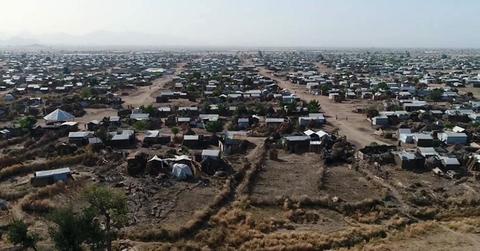Nigerian Refugees Are Planting 40,000 Trees Near Their Camp In Cameroon
Several acres of trees were lost in the drought-prone area of Cameroon where a refugee camp was established for victims of Boko Haram. Now, camp residents and the local community are working to re-establish the greenery.
Updated May 20 2019, 5:52 p.m. ET
A refugee camp, called Minawao, in Cameroon was established by Nigerians fleeing the terrorist group Boko Haram. The extreme circumstances had people struggling for survival. The area around the camp was quickly subject to deforestation, as trees were chopped down to make firewood and building materials for the 60,000 people who are now established at Minawao. About 2.5 acres of trees have disappeared. Fast Company reports that residents are now working to repopulate the trees that have been lost.
They're using a special pod developed by Land Life Company. Simple ways to plant enormous numbers of trees have become an increasingly popular business, especially models that are easy to use for people who may not have much experience with forestry. In addition to the planting, a small factory at the camp now makes "eco briquettes" from agricultural waste that can be burned for heat and power without losing more trees.
Land Life Company is working on the project through the United Nation's refugee agency, UNHCR. Charlotte Jongejanm, of Land Life Company, told Fast Company that they were interested in the opportunity because it offered an alternative to burning wood while also adding trees to the landscape.
“No longer will trees need to be knocked down to create traditional charcoal or just to use that dried wood to cook,” says Jongejan. “One of the reasons we were really attracted to the project is we were able to create quite a holistic approach to deforestation. Because if you just go at it by replanting trees and cross your fingers and hope the same thing might happen then everything when you come back five years there will be no trees. You have to give people an alternative.”
The cocoon is also suited to the environment in Cameroon, which is prone to drought. At planting, the pod is filled with water. The biodegradable paper cocoon provides what Jongejan calls “a buffer and a bridge to the tree for those first three to six months leading up to the rainy season.” It holds the water in and protects the roots from weeds and interference. Trees planted in December are thriving, though there's been no rain.
The tree-planting also provides jobs to people at the camp. There will be 300 people employed for a second round of planting in May and June. A nursery at the camp is growing seedlings, which will create an estimated 200,000 more baby trees a year. Eventually, some will grow to be nut and acacia trees, and potentially provide food, as well as shade and a positive impact on general air quality and temperature in the area.
“You’re encouraging an ecosystem to come back to life where there was nothing–no insect life, no soil life. With a healthy tree growing, it’s regenerating the soil, and that’s bringing back insects, bringing back wildlife, and that just reboots the whole system,” says Jongejan. It is also offering an opportunity for refugees to connect more to the local population. There has been tension with the influx of people into a community that is also struggling to get their needs met when it comes to food, water, and work. The hope is that by working together to bring the area back to life, more will grow than just trees.
